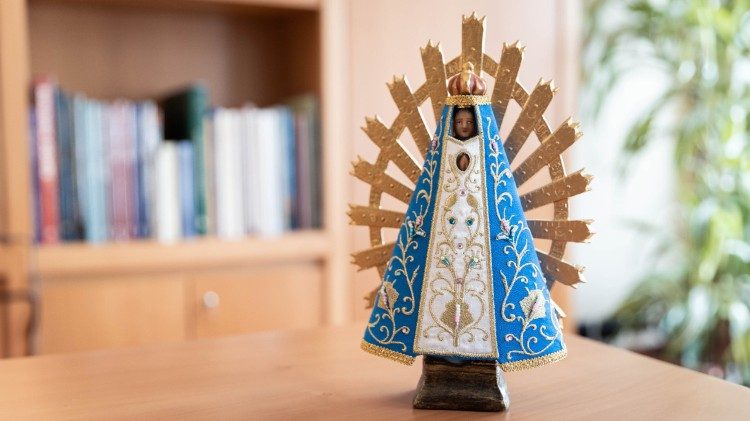Pope on Connection Between Vine and Branches
Full Text of Holy Father's Regina Caeli Commentary

Pope Francis on Sunday recalled Christ’s discussion of the connection between the vine and the branches in the day’s reading from the Gospel of John.
“In the Gospel of this Fifth Sunday of Easter (Jn 15:1-8), the Lord presents himself as the true vine and speaks of us as the branches that cannot live without being united to Him,” the Holy Father recalled before praying the Regina Caeli with the faithful in St. Peter’s Square on May 2, 2021. “And so He says: ‘I am the vine, you are the branches’ (v. 5).
“There is no vine without branches and vice versa. The branches are not self-sufficient but depend totally on the vine, which is the source of their existence”
The Pope went on to note that the term “abide” appears seven times in the day’s Gospel. It isn’t intended to suggest a passive relationship between Jesus and his followers but active involvement.
“This abiding is not a question of abiding passively, of ‘slumbering’ in the Lord, letting oneself be lulled by life: no, no! It is not this.
“The abiding in Him, the abiding in Jesus that He proposes to us is abiding actively, and also reciprocally. Why? Because the branches without the vine can do nothing, they need sap to grow and to bear fruit; but the vine, too, needs the branches, since fruit does not grow on the tree trunk. It is a reciprocal need, it is a question of a reciprocal abiding so as to bear fruit. We abide in Jesus and Jesus abides in us.”
Following is the Holy Father’s full commentary, provided by the Vatican:
Dear brothers and sisters, Buongiorno!
In the Gospel of this Fifth Sunday of Easter (Jn 15:1-8), the Lord presents himself as the true vine and speaks of us as the branches that cannot live without being united to Him. And so He says: “I am the vine, you are the branches” (v. 5). There is no vine without branches and vice versa. The branches are not self-sufficient but depend totally on the vine, which is the source of their existence.
Jesus insists on the verb “to abide”. He repeats it seven times in today’s Gospel reading. Before leaving this world and going to the Father, Jesus wants to reassure His disciples that they can continue to be united with Him. He says, “Abide in me, and I in you” (v. 4). This abiding is not a question of abiding passively, of “slumbering” in the Lord, letting oneself be lulled by life: no, no! It is not this. The abiding in Him, the abiding in Jesus that He proposes to us is abiding actively, and also reciprocally. Why? Because the branches without the vine can do nothing, they need sap to grow and to bear fruit; but the vine, too, needs the branches, since fruit does not grow on the tree trunk. It is a reciprocal need, it is a question of a reciprocal abiding so as to bear fruit. We abide in Jesus and Jesus abides in us.
First of all, we need Him. The Lord wants to say to us that before the observance of His commandments, before the beatitudes, before works of mercy, it is necessary to be united to Him, to remain in him. We cannot be good Christians if we do not remain in Jesus. With Him, instead, we can do everything (cf. Phil 4:13). With Him, we can do everything.
But even Jesus needs us, like the vine with the branches. Perhaps to say this seems audacious to us, and so we ask ourselves: in what sense does Jesus need us? He needs our witness. Like the branches the fruit we must give is the witness to our lives as Christians. After Jesus ascended to the Father, the task of the disciples – it is our task – is to continue to proclaim the Gospel in words and in deeds. And the disciples – we, Jesus’ disciples – do so by bearing witness to His love: the fruit to be borne is love. Attached to Christ, we receive the gifts of the Holy Spirit, and in this way we can do good to our neighbor, we can do good to society, to the Church. The tree is known by its fruit. A truly Christian life bears witness to Christ.
And how can we succeed in doing this? Jesus says to us: “If you abide in me, and my words abide in you, ask whatever you will, and it shall be done for you” (v.7). This too is bold: the certainty that what we ask for will be given to us. The fruitfulness of our life depends on prayer. We can ask to think like Him, to act like Him, to see the world and things with the eyes of Jesus. And in this way, to love our brothers and sisters, starting from the poorest and those who suffer most, as He did, and to love them with His heart and to bring to the world fruits of goodness, fruits of charity, fruits of peace.
Let us entrust ourselves to the intercession of the Virgin Mary. She always remained completely united to Jesus and bore much fruit. May she help us abide in Christ, in His love, in his word, to bear witness to the Risen Lord in the world.
After the Regina Caeli, the Holy Father continued:
Dear brothers and sisters,
Last Friday in Caracas, Venezuela, José Gregorio Hernández Cisneros, lay faithful, was beatified. He was a doctor filled with science and faith: he was able to recognize the face of Christ in the sick and, like the Good Samaritan, he helped them with evangelical charity. May his example help us to care for those who suffer in body and spirit. A round of applause for the new Blessed …
I send my best wishes to our brothers and sisters of the Orthodox Churches and of the Eastern and Latin Catholic Churches who today, according to the Julian calendar, celebrate the solemnity of Easter. May the Risen Lord fill them with light and peace and comfort the communities that live in particularly difficult situations. Happy Easter to them!
We have entered the month of May, in which popular piety expresses devotion to the Virgin Mary in many ways. This year it will be marked by a prayer marathon involving important Marian shrines, to implore the end of the pandemic. Yesterday evening was the first stop, in Saint Peter’s Basilica. In this context, there is an initiative that is very close to my heart: that of the Burmese Church, which invites us to pray for peace with a Hail Mary for Myanmar in our daily Rosary. Each of us turns to our Mother when we are in need or in difficulty; this month, we ask our Mother of Heaven to speak to the hearts of all leaders in Myanmar so that they may find the courage to walk the path of encounter, reconciliation, and peace.
With sadness I express my sympathy to the people of Israel for the accident which took place last Friday on Mount Meron, killing 45 people and injuring many. I assure you of my remembrance in prayer for the victims of this tragedy and for their families.
My thoughts today also go to the Meter Association, which I encourage to continue in its efforts to assist children who are victims of violence and exploitation.
And finally, I give a heartfelt greeting to all of you present here, dear Romans and pilgrims from various countries. In particular, I greet the members of the political Movement for unity founded by Chiara Lubich 25 years ago: best wishes and good work in the service of good politics.
And I wish you all a good Sunday. Please do not forget to pray for me. Enjoy your lunch and goodbye!
© Libreria Editrice Vatican
Related

Pope Francis Gifts a Statue of Our Lady of Luján to Gemelli and the Catholic University of the Sacred Heart
Exaudi Staff
25 April, 2025
2 min

Francis’s Tomb: A Legacy of Humility and Closeness
Exaudi Staff
25 April, 2025
4 min

The Family: A School of Love, Forgiveness, and Hope
Laetare
25 April, 2025
3 min

His Hope Does Not Die!
Mario J. Paredes
24 April, 2025
6 min
 (EN)
(EN)
 (ES)
(ES)
 (IT)
(IT)

